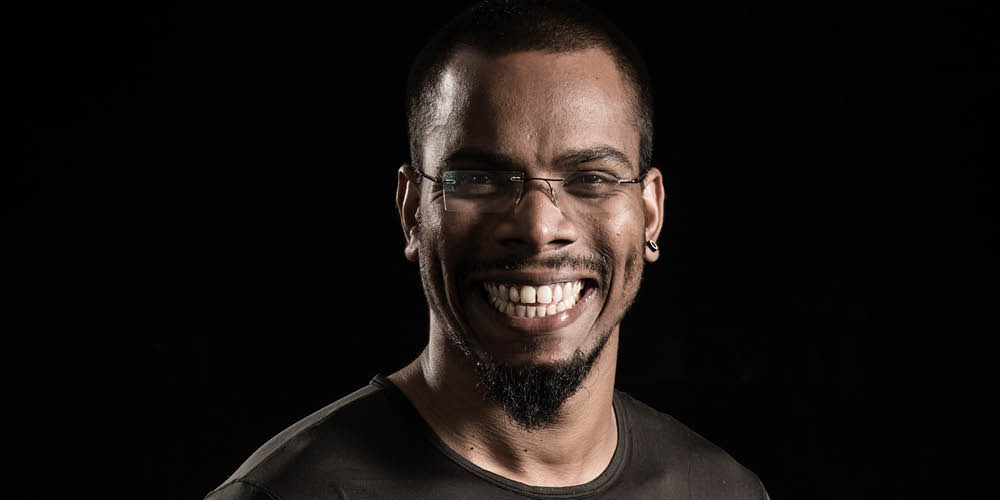
Saran Jith is an actor, painter and musician. The Kerala, India native has been researching, exploring and working in theatre, music and visual arts since 2007.
A veritable veteran, with over 30 theatrical performances in his experience, Saran has acted in plays that have been staged in national and international theatre festivals, such as ITFOK, RANGAYANA Mysore and PRD Kerala.
In visual arts, Saran’s works have been exhibited in several state and national exhibitions in India and Singapore, and has been in collaborative installation works conducted by the Kerala Sangeetha Nataka Academy.
As a musician, he has performed with classical dancers in India and elsewhere. Saran is currently practicing in mizhavu (Kerala traditional percussion instrument) under the reputed tutelage of Guru Kalamandalam VKK Hariharan.
Q: Just before ITI, you were…
I had just graduated with a Masters in Philosophy in theatre arts and philosophy in 2014. Before that, I had been studying and exploring different areas of art.
Q: So why cross the proverbial ocean?
I first heard about ITI from alumna Jyothirmayi Kurup [cohort 2014], my friend and colleague back home. I also happened to see The Water Station directed by TTRP (ITI’s former name) alumna Sankar Venkateswaran, and it really moved me. That was the first production of its kind in Kerala, a three-hour non-verbal show with the actors working in ultra-slow motion.
After that, I spoke to Sankar and other alumni like Mohamed Kunju Noushad and Sreejith Ramanan, and hearing how ITI had benefited them was what inspired me to make the leap to come here.
Q: In these three years of training, what stood out most for you?
It’s hard to pick out a particular lesson or experience, but the sessions with Sasi [in humanities and cultural/literary theory] were informative and explorative. I also have to mention our singing session with Robin Payne [former faculty] - learning a song from a completely different culture was such an experience for me, and she really made it enjoyable.
Q: How has what you learnt here shaped or changed you as an actor?
Coming from Kerala, the land of rituals and traditional art forms such as Kutiyattam, Kathakali and Theyyam, I understood what rasa* is. I came to ITI as an actor who expressed myself with my face and through internalisation of emotions. I’m not sure whether this joy of rasa is a limitation or a possibility.
However, having experienced the joy of rasa, I think I was limited by it, which affected my ability to perform in contemporary theatre or physical theatre. There was a conflict between what I had learnt previously and what I was learning at ITI, so at first I thought all this physical work here was unnecessary or ‘too much’. I still have that instinct, but after studying at ITI, I’m now aware of it and can work against it.
Studying here has given me the huge realisation that expression is not only conveyed with the face. So I would say that my culture gave me the ‘spirit of acting’, and ITI has given me the ‘body of acting’.
Studying here has given me the huge realisation that expression is not only conveyed with the face. So I would say that my culture gave me the ‘spirit of acting’, and ITI has given me the ‘body of acting’.
Q: What are your plans after graduation?
I plan to continue my academic studies and pursue a Ph.D. in Theatre back home. I also hope to have opportunities to perform my solo performance from the Final Year Individual Presentation [ed’s note: Saran’s solo piece, titled Urubhangam (The act of breaking the thigh), centred on the tale of Duryodhana from the Mahabharata]. I’ve already been invited to perform with some theatre practitioners and to train people back in Kerala. I’ll also be working on productions with a repertory theatre company.
Q: To someone thinking of making that same leap to ITI as you three years ago, you’d say…
Of course, you will get a certificate at the end of the three years, but you need to be passionate about acting to discover the hidden treasure of ITI. ITI is the one and only complete school for actors.
* In the Indian performing arts, a rasa is a sentiment or emotion evoked in each member of the audience by the art.

Photos by Bernie Ng